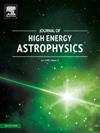Konoplya-Zhidenko 黑洞周围的广义相对论粘性吸积流
IF 10.2
4区 物理与天体物理
Q1 ASTRONOMY & ASTROPHYSICS
引用次数: 0
摘要
我们研究了Konoplya-Zhidenko(KZ)黑洞周围吸积流的性质,该黑洞是通过用单一变形参数对克尔公设进行变形而提出的,目的是利用引力波观测结果检验无毛定理。通过自洽地求解描述广义相对论粘性吸积流的动力学方程,找到了以能量(E)、角动量(L)、粘性参数(α)、自旋(ak)和形变参数(η0)等全局常数为基础的跨音吸积解。我们得到了五种不同类型的吸积解(O 型、A 型、A′型、W 型和 I 型),并观察到这些解并不是唯一的,而是在 L-E 平面的广泛参数空间中持续存在。此外,我们还发现,当相对论冲击条件得到满足时,粘性吸积流会产生冲击波。因此,我们得到了冲击诱导的全局吸积解,并研究了η0 对冲击特性的影响,如冲击半径(rsh)和冲击前沿电子温度(Te)的变化。此外,我们还利用相对论热轫致辐射系数计算了吸积流的光谱能量分布(SEDs),并研究了冲击诱发和无冲击两种方案中η0的增加对SEDs的影响。此外,我们还注意到准周期振荡频率(νQPO)和测亮圆盘光度(L)等可观测量与η0密切相关。最后,我们从现象学角度证明,KZ 黑洞与黑洞双星和候选黑洞中通常观测到的高频 QPO 是一致的。本文章由计算机程序翻译,如有差异,请以英文原文为准。
General relativistic viscous accretion flow around Konoplya-Zhidenko black hole
We investigate the properties of accretion flows around the Konoplya-Zhidenko (KZ) black hole, which is proposed by deforming the Kerr metric with a single deformation parameter to test the no-hair theorem using gravitational wave observations. The dynamical equations describing the general relativistic viscous accreting flow are solved self-consistently to find the transonic accretion solutions in terms of global constants, such as energy (E), angular momentum (), viscosity parameter (α), spin (), and deformation parameter (). We obtain five distinct types of accretion solutions (O, A, , W, and I-types), and observe that those solutions are not unique but rather continue to exist for wide range of parameter spaces in the plane. Furthermore, we find that the viscous accretion flows can harbor shock waves when the relativistic shock conditions are satisfied. Consequently, the shock-induced global accretion solutions are obtained, and the effect of on shock properties, such as shock radius () and change in electron temperature () across the shock front are investigated. Moreover, we calculate the spectral energy distributions (SEDs) of accretion flow using the relativistic thermal bremsstrahlung emission coefficient and study the modification of SEDs due to the increase of for both shock-induced and shock-free solutions. In addition, it has been noticed that the observable quantities, like quasi-periodic oscillation frequency () and bolometric disc luminosity (L), are strongly dependent on . Finally, we phenomenologically show that the KZ black hole is consistent with the high-frequency QPOs, commonly observed in black hole binaries and black hole candidates.
求助全文
通过发布文献求助,成功后即可免费获取论文全文。
去求助
来源期刊

Journal of High Energy Astrophysics
Earth and Planetary Sciences-Space and Planetary Science
CiteScore
9.70
自引率
5.30%
发文量
38
审稿时长
65 days
期刊介绍:
The journal welcomes manuscripts on theoretical models, simulations, and observations of highly energetic astrophysical objects both in our Galaxy and beyond. Among those, black holes at all scales, neutron stars, pulsars and their nebula, binaries, novae and supernovae, their remnants, active galaxies, and clusters are just a few examples. The journal will consider research across the whole electromagnetic spectrum, as well as research using various messengers, such as gravitational waves or neutrinos. Effects of high-energy phenomena on cosmology and star-formation, results from dedicated surveys expanding the knowledge of extreme environments, and astrophysical implications of dark matter are also welcomed topics.
 求助内容:
求助内容: 应助结果提醒方式:
应助结果提醒方式:


